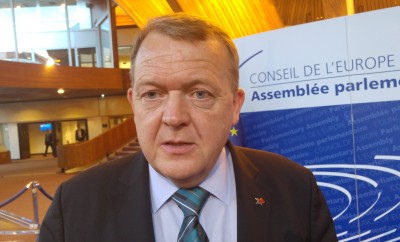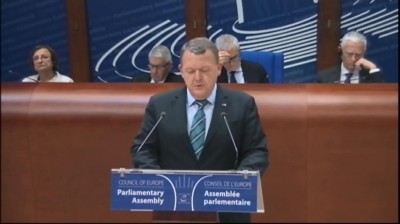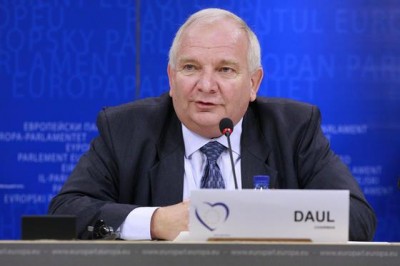 newsitems
newsitems  CoE President-i.o. Danish Prime Minister Rasmussen to EF: For Europe's Unity and Human Rights
CoE President-i.o. Danish Prime Minister Rasmussen to EF: For Europe's Unity and Human Rights
CoE President-i.o. Danish Prime Minister Rasmussen to EF: For Europe's Unity and Human Rights

*Strasbourg/CoE/Angelo Marcopolo/- Well Conscious of the current Need to protect Europe's Unity, but also of the Importance of Human Rights, appeared the current President-in-office of the CoE, during the Period of 11/2017 - 5/2018, twice Prime Minister of Denmark, Lars Lokke Rasmussen, in a Balanced Reply that he gave to an "Eurofora"'s Question, during an improptu Press-point at the CoE, just after his Speech and Public Debate with MEPs, at Strasbourg's PanEuropean Parliamentary Assembly's plenary session for the Winter 2018 :
- "Eurofora", who reminded the Fact that we had also covered the Previous Danish Chairmanship of the CoE, a Long Time ago, (Comp. then, Statements that gave us the Danish Foreign Minister, punlished at "TCWeekly"), had asked Rasmussen if he believed that he would manage to Safeguard Europe's Unity, during his Presidency, particularly as far as it concerns the well known current Controversies around Poland and Hungary, but also Russia, etc.
- "Yes, I think we should do our Outmost to Ensure the Unity of Europe" nowadays, the PanEuropean CoE's President-in-office, Positively Answered a relevant "Eurofora"s Question.
- "Hopefully", this should concern not only "Visegrad" Countries, such as, f.ex., Poland, Hungary, etc., but also "Russia", observed Prime Minister Rasmussen, who will Chair the CoE also during an Important, forthcoming Top Level Meeting of CoE Assembly's "Ad Hoc" Committee, with the participation of 2 Russian Representatives, next March 2018, in Paris, (See : ..., etc).
+ "But, in doing so, as you know, we (CoE) Need also to Emphasize that Decisions taken at European level should be fulfilled at National Level, and that all (CoE's) Member States should Live up to the Standards of the European Convention on Human Rights", he added, as a matter of Principle.

+ In this regard, during his Speech at CoE's Plenary, Earlier Today in Strasbourg, Prime Minister Rasmussen had critically observed that, recently, "there is a Significant Challenge of Inadequate National Implementation" of ECHR's Judgements, "in particular in relation to Serious, Systematic and Structural Human Rights Problems in some States". (i.e. a Record notoriously kept, usually, by Turkey, while also concerning, at Various Levels, mutatis-mutandis, more or less, several Other among the PanEuropean CoE's 47 Member Countries).
Yesterday, the Danish Foreign Minister Anders Samuelsen, had, smiling, Warned the CoE, that, on May 2018, the Danish Presidency was preparing to Host a PanEuropean CoE Committee of Ministers' session at the very "Castle of Hamlet", where Shakespeare had reportedly attributed his World-Famous "Existential" Question : - "To Be, or Not to be"....
I.e. something that the Recent CoE's (and/or EU's) upheavals have notoriously brought recently at a High Level of Intensity, (Coimp., f.ex., also : ..., etc).
(../..)
-----------------------
Main Menu
Home Press Deontology/Ethics 2009 Innovation Year EU endorses EuroFora's idea Multi-Lingual FORUM Subscribers/Donors FAQs Advanced search EuroFora supports Seabird newsitems In Brief European Headquarters' MAPs CoE Journalists Protection PlatformBRIEF NEWS
- 00:00 - 02.06.2021
- 00:00 - 18.10.2020
- 00:00 - 19.06.2020
- 00:00 - 18.05.2020
- 00:00 - 20.04.2020
- 00:00 - 02.02.2020
- 00:00 - 09.12.2019
- 00:00 - 27.11.2019
- 00:00 - 16.11.2019
Popular
- Yes, we could have prevented Ferguson riots says World Democracy Forum's Young American NGO to ERFRA
- Spanish People Elect CenterRIGHT Majority with 1st Party and Total of 178 MPs (6 More than the Left)
- Pflimlin's vision
- The European Athletic "Dream Team", after Barcelona 2010 Sport Championship Results
- Source Conseil d'Europe à ERFRA: Debatre Liberté d'Opposants à Loi livrant Mariage+Enfants à Homos ?
- Head of BioEthics InterGroup, MEP Peter Liese : "Embryonic stem cell research reaching its END" !?
- Spain: Jailed Turkish Terror suspect with Explosive,Drones,Chechen accomplices stirs Merah+ Burgas ?
- UN Head Ban Ki Moon at CoE World Democracy Forum : - "Listen to the People !"
Latest News
- Test Photos (f.ex.+ Invit to EU + Korea Peace meeting)
- EUOmbudsmen Conference 2022: Digital Gaps affect People's Trust threaten EF Project on EU Future ?
- French Election : Black Out on Virus, but Obligation for Fake 'Vaccines" Challenged
- Both French Presidential Candidates point at "Humanism" in crucial times...
- France : Zemmour = Outsider may become Game Changer in Presidential + Parliamentary Elections 2022
Statistics
Visitors: 61743333Archive
Login Form
Other Menu

EU Rapporteur on Enlargment Strategy, maistream German MEP Elmar Brok, speaking to "EuroFora", welcomed the proposal made earlier this week by French President Nicolas Sarkozy for the EU to"start Now Talks with Turkey to create a common Economic and Security area", instead of full Accession, at a period when Ankara looks more and more unfit and/or unwilling to respect EU conditions.
- "For Europe to have strong Political will, it must stop dilutiing itself in an endless Enlargement. It must have borders...Diversities enrich, on the condition that they don't undermine European Cohesion, and don't weaken EU Unity", Sarkozy stressed.
- "Countries like Turkey share a part of common destiny with Europe, with which they have a vocation to build a Privileged Relation, to be closely associated, but not to become Member of the EU" : "Noone respects his friends by telling them lies. Noone respects his friends by making them promises that will be never kept", he added.
That's why "we'd better start, from now, negotiating with Turkey to create a common Economic and Security area", Sarkozy proposed.
Significantly, the French President was repeatedly and largely applauded by EU citizens, 3 times, when he made the Turkey point, (strategically placed between Europe's "Political Will" and its cultural heritage, historically open to mutually enriching dialogue with all the World, but never diluted).
- "We could propose such a great ambition also to Russia, which must not be percieved as an Adversary of Europe, but as a Partner. Thus, we'd create a wide area, of more than 800 Million inhabitants, sharing the same Security, the same Prosperity", he concluded.

Sarkozy's move was anounced at the eve of a Franco-German Top meeting with Chancellor Angie Merkel in Berlin on Sunday, to jointly launch the EU Elections campain, after an EU Summit at nearby Prague, to launch a new kind of relations, called "Eastern Partnership", with neighboring countries such as Urkaine, Belarus, Moldova, Georgia, Armenia, Azerbaidjan, etc, (to which Russia, reportedly, is not - and does not want to be - included).
As for Ukraine, which has already expressed her wish to join the EU in future, "Kiev will have a special place, and a very important role to play", replied earlier this week in Strasbourg, to an "EuroFora" question EU Chairman in office , Czech vice-Prime Minister Alexander Vodra.
- "This direction is more Realistic for Turkey than Accession negotiations", reacted immediately EU Parliament's Rapporteur for Enlargment Strategy, mainstream German MEP Elmar Brok, commenting Sarkozy's idea for "EuroFora"
Particularly "as far as it concerns the respect of EU Rules by both sides", he added, hinting at Turkey's now obvious inability and/or unwillingness to abide with EU Acquis, EU Commitments (fex. on Cyprus, etc), and European Democracy/Human Rights rules. (Comp. infra).
Brok added that, in his view, a similar proposal might be made also to Ukraine and other neighbouring Countries, regardless if they have, or not, a "European vocation". This would not necessarily mean that there couldn't be any accession prospects at all." for all the countries that might be included in this area, according to Brok. But it's preferable, particularly for Turkey, "because it's a more Realistic approach than full Membership".
On this point, Sarkozy's proposal, (which he'll share with German Chancellor Merkel), seems more crystal-clear.

- "Turkey does not fullfil EU Criteria, and will never fullfil EU Criteria" on Human Rights, Democracy and Rule of Law. "Some have been lying to Ankara, but we must tell the Truth, and have honest and close relations with her", said meanwhile to "EuroFora" on the same issue also the President of EU Parliament's largest Group of MEPs (ChristianDemocrats/EPP), Joseph Daul.
------------------------------
"Hot" Debate at EU Parliament reveals CHANGE of mood towards "Suspension" of EU - Tukey talks.
------------------------------
Earlier this week, many MEPs, and even some of those who were previously in favor of Turkey's controversial EU bid, strongly criticized the persistance and even aggravation of serious Human Rights violations in the country, that ECHR continues to "unanimously" condemn ":
- "After winning a big victory in the latest Local Elections, the pro-Kurdish party DTP almost doubled its Elected Mayors from 52 to 98", but afterwards "more than 400 politicians were thrown to Prison and prosecuted" by the Turkish Authorities, denounced on behalf of the ChristianDemocrat/EPP Group, Belgian MEP Frieda Brepoels.
At the same time, "more than 1.500 Children are closed in Turkish Prisons", she added. "What will the EU Commission do" against these facts ?
- "Turkey appears to be at greater Distance away from Copenhagen Criteria after 4 Years of accession Negotiations, than when they started !", denounced on behalf of the Liberal Group, German MEP Alexander Lambsdorf.
"On the central issue of Press Freedom, Critical Journalists face obstacles for their accreditation, others are prosecuted, condemned, fined and/or jailed, Media blocked or closed", he denounced.
- "EU Made 2 grave Mistakes with Turkey : To start accession negotiations, and to continue them", despite everything, criticized Dutch MEP Bastian Belder, on behalf of the Ind/Dem group.


















